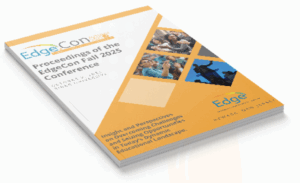Beyond the Buzz: EdgeCon Launches Proceedings to Amplify Innovation in Higher Education
For years, EdgeCon has served as a vibrant nexus for forward-thinking minds in higher education, a space where cutting-edge ideas around technology, pedagogy, and leadership converge. Attendees leave energized, their notebooks filled with insights gleaned from dynamic presentations and collaborative discussions. But what happens to those sparks of innovation once the conference concludes? How can the impactful work shared at EdgeCon continue to resonate and influence the broader landscape of digital transformation in academia?
This very question spurred Edge to embark on an exciting new initiative: the launch of its official EdgeCon Conference Proceedings (EdgeCon Proceedings). This endeavor, unveiled at the recent EdgeCon Spring, has already generated considerable buzz, promising to extend the life and reach of the valuable knowledge exchanged at each event.
Laura M. Romeo, Ph.D., Director of Digital Learning Innovation, Scholarship, and Educational Services at Edge explains, “There’s a lot of meaningful, future-focused work happening across higher ed—but it doesn’t always have a place to land. EdgeCon Proceedings are our way of creating that space—welcoming ideas in different formats, from different roles, and making sure they’re seen, cited, and sustained.” Romeo further elaborates, “EdgeCon has always been an amazing space for emerging, forward-thinking ideas and, year after year, we’d see those ideas receive tremendous response, but have a somewhat short lifespan. With Edge’s broader mission of empowering institutions through knowledge and collaboration, it felt natural to create something that extended the life of those conversations, presentations, and sessions.”

The launch of the EdgeCon Proceedings marks an exciting evolution for the conference and the broader higher education community. By providing a platform to preserve, amplify, and build upon the innovative work shared at each event, Edge is taking a significant step towards fostering a more collaborative and impactful future for digital transformation in academia. As Romeo aptly concludes, “If there is somebody out there doing thoughtful, impactful work in digital transformation, this is a platform for them. We want to hear from them. The door is open, and honestly, I’m personally excited to see what’s going to be shared.”
The aim of EdgeCon Proceedings is to be more than just a static collection of papers. They are envisioned as a dynamic platform to preserve and elevate the unique blend of academic research and on-the-ground innovation that characterizes the EdgeCon experience. “There’s a lot of power in capturing those intersections,” Romeo emphasizes, “where theory meets practice and where different roles in higher education come together—technologists, faculty, administration, and beyond.”
Leading the charge in shaping EdgeCon Proceedings is Romeo, who outlines the inclusive vision for submissions. “When we started out in the design process of EdgeCon Proceedings, we knew that we wanted to reflect the range of work that’s happening across higher education. We know that not everyone is writing traditional research papers, and that’s fine, and honestly, it’s a big strength.”
“Higher education is in the middle of a transformative moment. Conversations around AI, digital equity, scalable innovation, and the future of teaching and learning are happening across institutions, but often in isolated pockets. We saw an opportunity to create something that captures those conversations and helps them travel, spark dialogue, and influence real change across the broader ecosystem,” explains Romeo. “EdgeCon Proceedings aren’t just a publication, they’re a tool for amplifying meaningful, forward-thinking work that might otherwise go unseen or unshared.”
To this end, EdgeCon Proceedings will embrace four distinct types of submissions:
- Traditional Research Papers: Capturing new insights through empirical studies or theoretical analysis
- Case Studies: Examining real institutional initiatives, highlighting what worked, what didn’t, and the lessons learned.
- Works in Progress: Providing a space for evolving ideas and sparking dialogue on emerging trends.
- Implementation Reports: Implementation Reports: Focusing on the practical application of tools, systems, or strategies and their real-world results.
This multi-faceted approach is designed to open doors to a diverse range of voices within the higher education ecosystem. “This particular structure opens the door for a lot of different voices,” Romeo points out. “Faculty, yes, but also those IT professionals and instructional designers, academic leadership, even grad students, and also those industry collaborators that we work with day in and day out. We’re interested in their ideas, and ideally helping us as a whole community to move forward digital transformation, wherever those ideas originate.”

“This particular structure opens the door for a lot of different voices. Faculty, yes, but also those IT professionals and instructional designers, academic leadership, even grad students, and also those industry collaborators that we work with day in and day out. We’re interested in their ideas, and ideally helping us as a whole community to move forward digital transformation, wherever those ideas originate.”
 Romeo echoes this sentiment, emphasizing that EdgeCon Proceedings are not solely focused on traditional academic outputs. “It’s not just about what traditionally counts as scholarship, i.e. the faculty papers and things of that nature. We’re creating a space where innovative thinking is recognized no matter what the format, no matter what the person.” She further elaborates, “If you’re working on an early-stage research idea that’s still taking shape, you don’t have to wait until it’s done in the conventional sense. If it’s grounded in something that’s promising and relevant and important and interesting, we want to see it.”
Romeo echoes this sentiment, emphasizing that EdgeCon Proceedings are not solely focused on traditional academic outputs. “It’s not just about what traditionally counts as scholarship, i.e. the faculty papers and things of that nature. We’re creating a space where innovative thinking is recognized no matter what the format, no matter what the person.” She further elaborates, “If you’re working on an early-stage research idea that’s still taking shape, you don’t have to wait until it’s done in the conventional sense. If it’s grounded in something that’s promising and relevant and important and interesting, we want to see it.”
A key differentiator for the EdgeCon Proceedings lies in its deliberate bridging of theory and practice. “One thing that really sets us apart is how deliberately we’re working at the intersection of theory and practice,” explains Romeo. “A lot of publications tend to fall into one camp or the other—they’re really either just all academic or they’re very applied in nature. What we’re seeing in digital transformation is that the most effective work really lives somewhere in the middle. That’s the space we’re trying to create.”
To ensure rigor and credibility while embracing innovation, EdgeCon Proceedings will employ a double-blind peer review process. “We’re building a rigorous double-blind peer review process with reviewers who understand that innovation doesn’t always follow traditional academic pathways,” Romeo clarifies. “We’re looking for bold ideas that might challenge norms or push boundaries, not just the finally polished journal articles.”
From an author’s perspective, the EdgeCon Proceedings offer significant benefits, including formal academic recognition. “We will definitely be giving that real academic credit because every published paper is going to get a DOI assigned to it and will be released under a Creative Commons license. And that means that the work is going to be visible and citable while also properly attributed,” Romeo affirms. “Taking this route ensures discoverability and allows authors to maintain rights to their work.”
The inaugural edition of the EdgeCon Proceedings will be aligned with the upcoming EdgeCon Autumn 2025, which will focus on the theme of AI and advanced computing in education. Submissions for this edition will open on May 15th and close on July 15th, with a detailed timeline for review and revisions leading to publication approximately one to two weeks after the conference in October. Following this initial cycle, EdgeCon Proceedings will transition to a rolling submission process, allowing for greater flexibility for authors.
“No matter when someone will submit, early on or down the road, we’re creating support to help them through the process,” assures Romeo. “Templates, formatting guides, example papers, things like that. Whether it’s your first time submitting to a peer-reviewed publication, or you publish dozens of papers, we want the experience to be easy, accessible, and rewarding.”

Romeo emphasizes that EdgeCon Proceedings are not solely focused on traditional academic outputs. “It’s not just about what traditionally counts as scholarship, i.e. the faculty papers and things of that nature. We’re creating a space where innovative thinking is recognized no matter what the format, no matter what the person. If you’re working on an early-stage research idea that’s still taking shape, you don’t have to wait until it’s done in the conventional sense. If it’s grounded in something that’s promising and relevant and important and interesting, we want to see it.”
The review process itself is designed to be both rigorous and inclusive. “All the submissions will go through that double-blind peer review process,” Romeo explains. “Reviewers don’t know who the authors are and vice versa. So that helps us stay focused on the ideas themselves and not the credentials or affiliations or anything like that. We will be evaluating submissions based on criteria like relevance to digital transformation, innovation, quality of writing, supporting evidence, practical applications, scholarly value, all that type of stuff. We apply those criteria appropriately depending on the submission type.”
Romeo adds that the reviewer pool reflects this inclusive philosophy. “We’ve built our reviewer pool with that same philosophy. So we have opened it up to include faculty, yes, but also IT leaders, instructional designers, and then other professionals who just understand this space and also the topic that best fits their area of expertise. In doing so, we’re matching submissions with reviewers who can fairly assess the value of the work.”
Looking beyond the initial publication, the EdgeCon team envisions the Proceedings as a springboard for further engagement and recognition. “We’re thinking about how to create additional touch points for authors beyond those proceedings,” hints Romeo. “Outstanding work, we may feature in our digital magazine or be invited to a webinar series, or the EdgeCast series. And we’re trying to build a broader ecosystem that supports continued visibility and dialogue around these contributions.”
The launch of the EdgeCon Proceedings marks an exciting evolution for the conference and the broader higher education community. By providing a platform to preserve, amplify, and build upon the innovative work shared at each event, Edge is taking a significant step towards fostering a more collaborative and impactful future for digital transformation in academia. As Romeo aptly concludes, “If there is somebody out there doing thoughtful, impactful work in digital transformation, this is a platform for them. We want to hear from them. The door is open, and honestly, I’m personally excited to see what’s going to be shared.”
